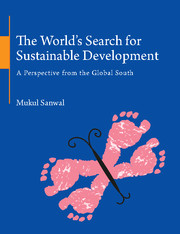Book contents
- Frontmatter
- Dedication
- Contents
- Preface
- Acknowledgments
- Abbreviations
- INTRODUCTION
- 1 Social Dimension of Sustainability
- CONSUMPTION IN AN UNEQUAL WORLD: FRAMING INTERNATIONAL COOPERATION
- CLIMATE POLICY: GLOBAL TO NATIONAL
- SUSTAINABLE DEVELOPMENT: NATIONAL TO GLOBAL
- CONSUMPTION IN A MORE EQUAL WORLD: SHAPING SOCIETAL FUNCTIONS
- GEOPOLITICS TO GEOECONOMICS: RURAL–URBAN DIVIDE, RATHER THAN BETWEEN COUNTRIES
- THE ASIAN CENTURY
- Index
GEOPOLITICS TO GEOECONOMICS: RURAL–URBAN DIVIDE, RATHER THAN BETWEEN COUNTRIES
Published online by Cambridge University Press: 18 December 2015
- Frontmatter
- Dedication
- Contents
- Preface
- Acknowledgments
- Abbreviations
- INTRODUCTION
- 1 Social Dimension of Sustainability
- CONSUMPTION IN AN UNEQUAL WORLD: FRAMING INTERNATIONAL COOPERATION
- CLIMATE POLICY: GLOBAL TO NATIONAL
- SUSTAINABLE DEVELOPMENT: NATIONAL TO GLOBAL
- CONSUMPTION IN A MORE EQUAL WORLD: SHAPING SOCIETAL FUNCTIONS
- GEOPOLITICS TO GEOECONOMICS: RURAL–URBAN DIVIDE, RATHER THAN BETWEEN COUNTRIES
- THE ASIAN CENTURY
- Index
Summary
“… Living well within ecological limits will require fundamental transitions in the systems of production and consumption that are the root cause of environmental and climate pressures. Such transitions will, by their character, entail profound changes in dominant institutions, practices, technologies, policies, lifestyles and thinking … The overall challenge for the next decades will be to recalibrate mobility, agriculture, energy, urban development, and other core systems of provision in such way that global natural systems maintain their resilience, as the basis for a decent life … the most fundamental shift in modern society in the 21st century will be to reinvent what it means to have a high level of societal well-being, while accepting and embracing the limits of the planet”.
The European Environment: State and Outlook 2015 – Assessment of Global Megatrends, European Environment Agency, March 2015.
“… the broader debate to define and implement post-2015 Sustainable Development Goals (SDGs) … addressing fragility in the new framework will be crucial if strides in reducing poverty are to be made … fragility as an issue of universal character that can affect all countries, not only those traditionally considered “fragile” or conflict-affected … violence, access to justice, accountable and inclusive institutions, economic inclusion and stability, and capacities to prevent and adapt to social, economic and environmental shocks and disasters … making headway on the targets will require building a new portfolio of tools and interventions, and an understanding of the role the international community should and can play in assisting this process.
States of Fragility 2015: Meeting Post-2015 Ambitions, OECD, March 2015
‘… The 18th Party Congress of the Peoples Republic of China, in 2012, incorporated in the Party Constitution the statement that promoting ecological progress is a long term task of vital importance to the people's well-being and China's future … key principles entail conserving resources, protecting the environment and promoting its natural restoration … the objective is to work hard to build a beautiful county, and achieve lasting and sustainable development of the Chinese nation.
An ecological civilization is considered a governing idea and national strategy for the whole society.
- Type
- Chapter
- Information
- The World's Search for Sustainable DevelopmentA Perspective from the Global South, pp. 247 - 248Publisher: Cambridge University PressPrint publication year: 2015

